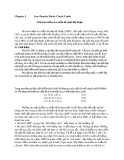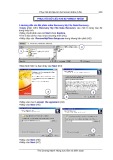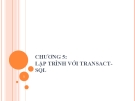
Buffer Overflow Exploits
CS-480b
Dick Steflik

What is a buffer overflow?
•Memory
•global static
•heap
•malloc( ) , new
•Stack
•non-static local variabled
•value parameters
•Buffer is a contiguously allocated chunk of
memory
•Anytime we put more data into a data
structure than it was designed for.

Side Effects
•The side effects of a buffer overflow may
cause:
•the program may work strangely
•the program may fail
•the program may continue without any noticeable
problems

Side Effects Depend on:
•How much data was written past the end of
the buffer
•What data (if any) are overwritten
•Whether the program attempts to read data
that are overwritten
•What data ends up replacing the memory
that gets overwritten

Three Basic Attacks
•Overrun a static buffer
•hurts data but little to no exposure for loss of
control
•Stack smashing
•place attack code in memory, find some sloppy
use of the runtime stack, use stack to transfer
control to attack code
•Heap overflow
•much harder to exploit as there isn’t usually a
mechanism to gain control









![Bộ nhớ ảo: Chương 7 [Hướng dẫn chi tiết]](https://cdn.tailieu.vn/images/document/thumbnail/2013/20131227/mobile_12/135x160/7511388132073.jpg)







![Sổ tay Kỹ năng nhận diện & phòng chống lừa đảo trực tuyến [Mới nhất]](https://cdn.tailieu.vn/images/document/thumbnail/2025/20251017/kimphuong1001/135x160/8271760665726.jpg)
![Cẩm nang An toàn trực tuyến [Mới nhất]](https://cdn.tailieu.vn/images/document/thumbnail/2025/20251017/kimphuong1001/135x160/8031760666413.jpg)







